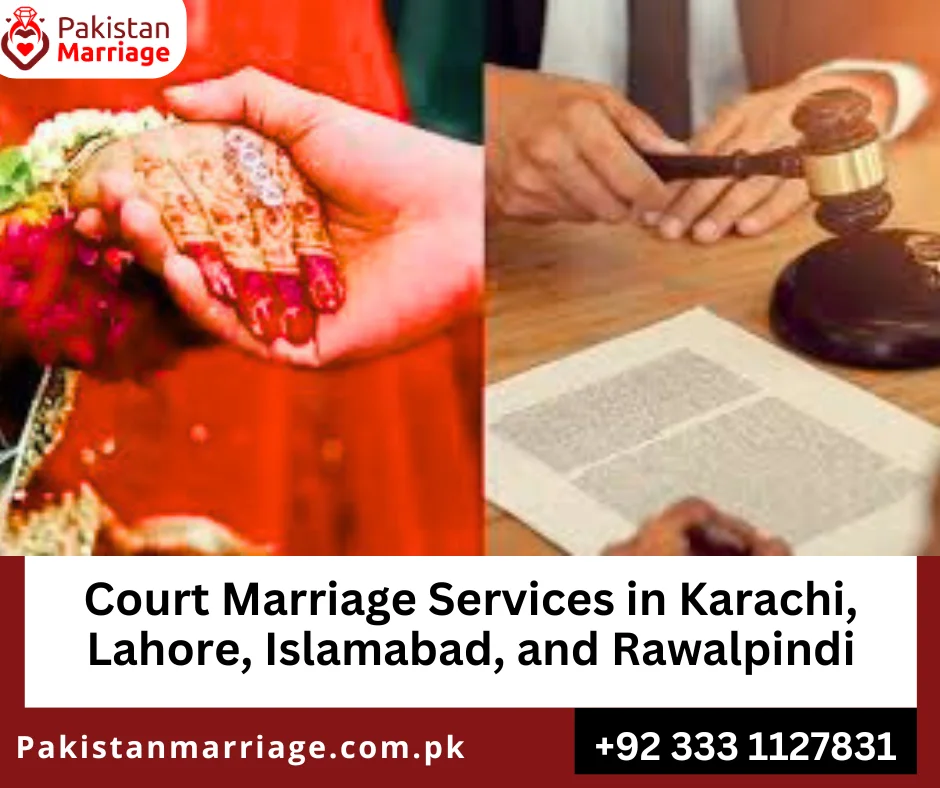
Court marriage is a legal process through which couples marry in court rather than in traditional religious or cultural ceremonies. It’s a simple and efficient option that eliminates the need for elaborate rituals. Increasingly, couples are opting for this route to avoid the complications of traditional weddings.
A court marriage grants couples official legal recognition, conferring rights and responsibilities that are often not available in traditional or unofficial unions. In Pakistan’s major cities, couples can easily access these services for a secure legal status.
The process involves both individuals filling out an application, providing documents, and appearing before an official who conducts the ceremony. This saves time and money compared to traditional weddings. Court marriage services in Pakistan also help couples avoid social pressures and focus on their commitment to each other.
Court marriage can reduce disagreements that sometimes happen in traditional weddings, especially for couples from different backgrounds. The legal process treats both partners equally. In cities such as Karachi, Lahore, Islamabad, and Rawalpindi, court marriage is a practical and modern option.

In today’s Pakistan, many people are choosing court marriage instead of traditional weddings. One main reason is to skip long and tiresome rituals that can be hard for couples and their families. Court marriage makes things quick and easy, allowing couples to get married with less stress and fewer plans than those associated with religious or cultural weddings.
Court marriages in Pakistan are fast. After you submit your documents, the marriage is often completed in just one day—ideal for couples seeking minimal delay. Major cities facilitate quick access to these services.
Another reason couples choose court marriage is its affordability. Traditional weddings incur significant costs, whereas court marriages only require meeting the legal steps, allowing couples to allocate their savings elsewhere, such as for education or home purchases.
Court marriage lets couples make their own choices about marriage, without having to follow traditional expectations. They can get married in a manner that aligns with their own values. For many, it’s not just a legal step, but also a way to enjoy more personal freedom.
The court marriage process in Pakistan consists of clear steps. Couples must gather the required documents, including identity cards, passport-sized photos, and legal proof of their capacity to marry. Requirements may vary slightly by city, so it is advisable to check local rules.
Next, couples visit the local court with jurisdiction over the matter. At the court, they submit documentation for verification. An appointment for the marriage ceremony will be scheduled once all documents have been verified. This ensures legal requirements are met and the couple understands their responsibilities.
Two witnesses (over eighteen) are required for the ceremony. This underlines the need for capable witnesses. Afterward, the marriage contract, known as a Nikah Nama, is signed and registered. A marriage certificate is then issued as legal proof of the marriage.
Knowing how court marriage works can help reduce stress and make the process easier for couples in Karachi, Lahore, Islamabad, and Rawalpindi. The main point is that being prepared and understanding the steps makes everything go more smoothly. Key takeaway: Preparation and awareness are essential for a stress-free court marriage process.


Legal Requirements for Court Marriage in Karachi, Lahore, Islamabad, and Rawalpindi. After outlining the process, it’s crucial to understand the specific legal requirements for court marriages in these cities. Familiarity with these rules is essential for the validity of your marriage and may depend on your location.
Court marriage is often viewed as a simpler alternative to traditional weddings. Still, it’s essential to be aware of the legal requirements in each major city, such as Karachi, Lahore, Islamabad, and Rawalpindi. These rules may vary depending on local laws and customs.
In Karachi, the minimum age for marriage is 18 for both males and females. A valid CNIC (Computerized National Identity Card) is mandatory for identity verification. Furthermore, if either party is underage, parental consent is required. Alongside the CNIC, two passport-sized photographs and the completed application form must be submitted to the marriage registrar.
In Lahore, similar age regulations apply, requiring individuals to be at least 18 years old. Documentation needed for a court marriage service in Lahore includes a copy of the CNIC for both parties, two witnesses with valid identification, and photographs. Parents’ consent is necessary if either of the parties is underage, ensuring compliance with legal statutes.
Islamabad follows a similar framework, requiring both parties to present their identity cards. Additionally, the age restriction of 18 remains in effect. The court marriage service in Islamabad can be facilitated by submitting the necessary documents, including parental consent if applicable.
In Rawalpindi, couples must adhere to the same age and documentation requirements, including a CNIC and the presentation of both witnesses’ identities. Local registrars may impose additional regulations or checks, underscoring the importance of a clear understanding of the procedures involved.
While the specifics vary by city, the primary requirements for a court marriage are generally similar. Knowing local rules can make the process smoother.
Court marriages, while gaining popularity, are often surrounded by numerous myths and misconceptions that can deter couples from considering them as a valid form of union. Understanding these myths is vital so couples can make informed decisions. One prevalent myth is the belief that court marriages lack legal validity. In reality, court marriages conducted through registered marriage services possess full legal status in Pakistan. They are recognized by law and grant couples the same rights and responsibilities as other forms of marriage. This misconception may stem from a lack of understanding and awareness about the legal frameworks surrounding marital agreements in the country.
Another common belief is that only couples facing societal pressures or unique circumstances pursue court marriages. This notion perpetuates a social stigma that court marriages are inferior or only suitable for those who cannot undergo traditional ceremonies. However, this is far from the truth. Many couples opt for court marriage services in Karachi, Lahore, Islamabad, and Rawalpindi to avoid the extensive and often burdensome planning associated with traditional weddings. They appreciate the simplicity and directness that court marriages provide, making it a choice for diverse couples across various backgrounds and socio-economic statuses.
The perception that court marriages are complicated or fraught with challenges can also deter couples from pursuing them. While it is true that navigating legal procedures requires some effort, many court marriage service providers in Pakistan offer streamlined solutions to assist couples through the process. These services ensure that all necessary documentation is prepared accurately, thereby making the experience much more manageable. The key takeaway Is That Court marriage services significantly simplify the legal process for couples.
Starting the court marriage process can feel overwhelming, but using the right service provider and understanding what to expect makes it easier. Here are some helpful tips for a smooth court marriage, especially if you’re using services in Karachi, Lahore, Islamabad, or Rawalpindi.
First, prepare your documents in advance. You’ll usually need your national ID cards, photos, and sometimes affidavits. Since each city may have different rules, please check with your local courthouse or service provider to confirm the specific requirements. This way, you can avoid last-minute problems and make the process smoother.
Next, timing can play a significant role in your court marriage. Consider scheduling your appointment on weekdays, as weekends may be busier and involve longer waiting times. Choosing early morning slots further expedites the process, allowing you to complete your marriage without unnecessary delays. Additionally, this timing consideration can contribute to a less chaotic environment, helping you remain calm during the proceedings.
Finally, knowing what will happen in the courtroom can help you feel more relaxed. Learn about the steps, like who will be there, what you’ll need to say, and when to sign documents. Being prepared lets you focus on the importance of the day. Court marriage services in Islamabad and other cities can guide you through the process.
By following these expert tips and preparing accordingly, couples can ensure a more pleasant and efficient court marriage experience, allowing them to focus on what truly matters: their commitment to one another. The key takeaway: Preparation and knowledge lead to a smoother, less stressful process.
If you’re looking for a court marriage service in Pakistan, particularly in Karachi, Lahore, Islamabad, or Rawalpindi, it’s crucial to choose a provider that adheres to the law and provides excellent customer service. As you’ve seen, preparation makes the process easier, and choosing a reliable provider is vital. Start by searching online for providers with official websites and clear service details. A professional website is often a good sign.
When choosing a provider, focus on those who are well-established locally and have a proven track record in the field. Working for many years often means they are trusted. Talk with friends or acquaintances who have used court marriage services before, as their advice can be helpful. Also, ensure the provider holds the necessary license to perform court marriages. This is important so that your marriage is recognized as legal.
Another important thing is what customers say. Read reviews and comments online to see other people’s opinions. You can also speak directly with the provider to inquire about their process and experience. A good provider will answer your questions and provide you with all the necessary details. The goal is to ensure that the court marriage service in Karachi, Lahore, Islamabad, or Rawalpindi you choose meets all legal requirements and makes the process easy. The main idea is to conduct thorough research and seek advice to find a reliable provider.


After your court marriage, the process continues with a few more steps to ensure your union is fully recognized by law. Understanding these tasks helps ensure that your marriage is officially recognized.
After getting married in court, couples must complete some essential paperwork to ensure their marriage is officially recognized. This is especially true in cities like Karachi, Lahore, Islamabad, and Rawalpindi, where court marriage services can help guide you through the process.
First, get a marriage certificate. This is a legal document that confirms your marriage. You need this certificate for tasks such as changing your name, updating your ID, and other legal matters. You can obtain your marriage certificate from the court or office where you were married. It’s a good idea to keep more than one copy in case you need it in different places.
In addition to the marriage certificate, consider changing your name if desired for personal or cultural reasons. This process involves updating legal documents such as identity cards, passports, and bank accounts. Each institution may have different requirements, so inquire about procedures at each place where changes are made.
Newlyweds should also familiarize themselves with any required registrations or legal formalities in their city. In Pakistan, court marriage services often guide couples in filing the needed documents with local authorities. This helps ensure the marriage is fully recognized under the law.
Finally, while navigating these steps may seem overwhelming, engaging a reliable court marriage service in Pakistan can significantly simplify the post-marriage process. These services not only facilitate the marriage ceremony but also assist with subsequent administrative tasks, ensuring couples can focus on their new life together without undue stress. The key takeaway: Reliable service providers ease post-marriage administration for couples.
In today’s fast-paced society, ideas about love and commitment are evolving, and couples are seeking innovative ways to express their commitment. Following the post-marriage steps, it’s clear that in cities such as Karachi, Lahore, Islamabad, and Rawalpindi, court marriage has become a popular option. It’s a legal and efficient way to formalize a relationship without the usual paperwork and delays of traditional weddings.
Court marriage services in these cities streamline the process, allowing couples to avoid the lengthy rituals of traditional weddings. This option is well-suited for those seeking swift, legally recognized unions that grant immediate rights and responsibilities.
Moreover, seeking court marriages reflects a growing societal acceptance of diverse relationships. Choosing court marriage shows that society is becoming more open to different kinds of relationships. It lets couples make their own choices without worrying about what others think, so they can focus on their commitment.
This change reflects more modern and accepting views on marriage. Take the next step in your relationship by connecting with a reputable court marriage service provider in Karachi, Lahore, Islamabad, or Rawalpindi. Act today to begin your journey towards a secure, recognized, and fulfilling partnership. Embrace this practical and modern path—contact a trusted provider now and start building your future together.
M-51, Muneer Mobile Mall, Block 17, Near Perfume Chowk & Jauhar Chowrangi, Gulistan-e-Jauhar, Karachi, Pakistan
Qanoon House, T-219, Supreme Corner, Main Jauhar Chowrangi, Block 18, Gulistan-e-Jauhar, Karachi, Pakistan
Pakistan Legal Advisors, Office No. 5, 2nd Floor, Laraib Plaza, Karachi Company, G-9 Markaz, Karachi, Pakistan
Qanoon Online, 1st Floor, Al-Mairaj Arcade, Near Surayya Azeem Trust Hospital, Chauburji Chowk, Lahore, Pakistan
Marriage lawyers can be contacted for assistance with online Nikah, Nikah Nama, and Marriage Registration Certificates. You can email or reach out for confidential legal support. Your matter will be handled with complete privacy, and you will receive a prompt, professional response. Overseas and remote solemnization is explained in Online Nikah in Pakistan.